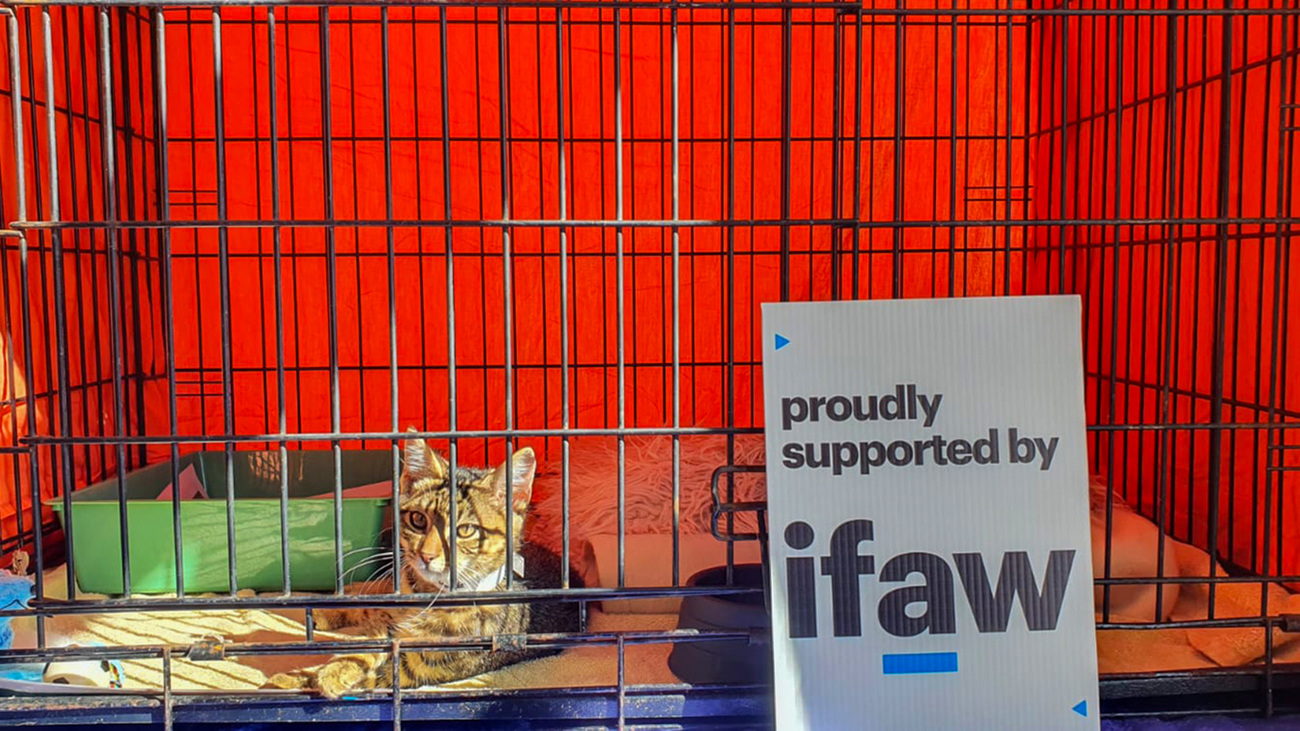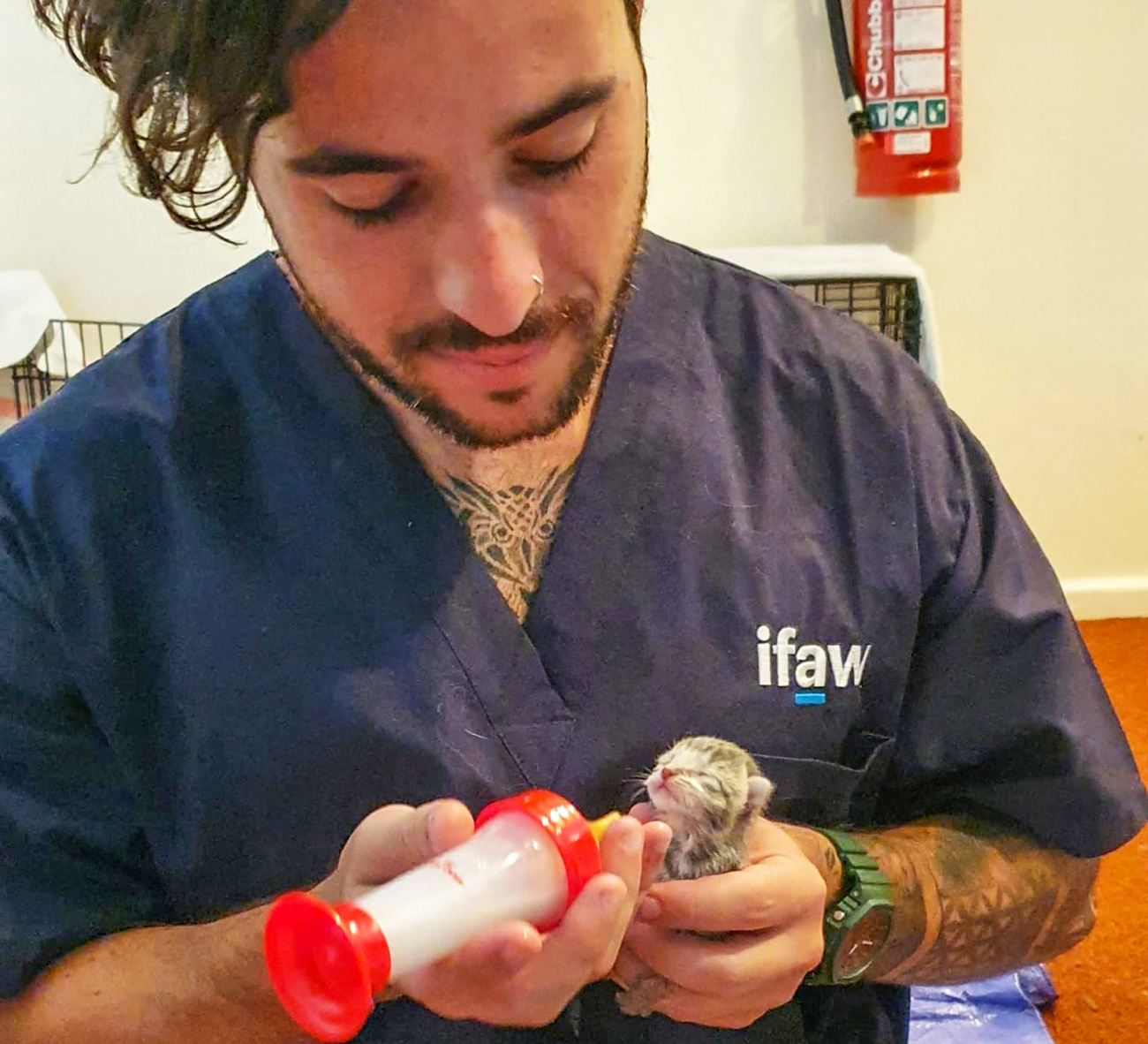Updates
IFAW rushes urgent support for vulnerable puffins after devastating floods in France
Read morehow I helped animals survive the aftermath of Cyclone Gabrielle in New Zealand

Written by Robert Leach – animal rescue program officer, IFAW
During a horrific couple of days in February, severe Tropical Cyclone Gabrielle managed to devastate parts of New Zealand’s North Island. The cyclone brought torrential rain and heavy winds, which led to extensive flooding and deadly landslides. The destruction was heartbreaking—towns decimated, communities fractured, and so many farm animal carcasses that it became necessary to pile them up by the side of the road.
Within 24 hours of the cyclone making landfall, the incredible team at Helping You Help Animals NZ (HUHA NZ) had already established an animal evacuation shelter for the affected communities around Auckland with emergency funding from IFAW. Once the cyclone tracked further south and barrelled through the Hawkes Bay region, HUHA NZ, under the direction of the NZ Ministry of Primary Industries, requested additional IFAW support.
I’m the Oceania animal rescue program officer, and IFAW immediately deployed me to Hawkes Bay, where the HUHA NZ team established a second animal evacuation centre. The shelter was located in the nearby town of Hastings, which was left with only one major road access point.
After a two-and-a-half-hour drive with my rental car, I arrived in the evening and was welcomed by the HUHA team as they were settling down for dinner. Walking through the shelter, I was greeted by the recently rescued dogs. They were confused and tired, lifting just their eyelids to see yet another set of footsteps that weren’t their owner’s.
I made my way through to the next room where the cats were sheltered—and apparently so were the humans. Between each row of cat cages were sleeping bags set up for the volunteers. I found a vacant spot and made friends with my new furry neighbours before settling in for the night.
The days went by fast. From first light, the team attended to all the shelter animals, making sure they were settled and comfortable, freeing ourselves to meet the needs of the day ahead. To my delight, I was tasked with looking after the cats and the wildlife/farm animals.

As I met some of the cats, I learnt of their horrific encounters and what led them to us. One story that stood out to me was a beautiful ginger cat—for privacy purposes I’ll call him Freddy. Freddy’s human family were hastily rescued by boat as floodwaters rose rapidly in their house. Thankfully, they all made it to safety. Freddy and his sibling watched them depart from the windowsill. Once the animal rescue teams were able to make their way to the house, they discovered that Freddy was agile enough to jump into the ceiling cavity, but sadly his more-elderly sibling was not able to follow. Freddy was brought to us at the animal shelter where we showered him with so much love and attention in such a devastating time. When Freddy was reunited with his human family there were tears of joy shared by everyone.
Between the triaging of new animals and caring for the shelter animals, I was helping where I could with the relief efforts. Incredibly, every new minute brought a new moment of the community coming together and finding any way to help others, and it was overwhelmingly beautiful. They donated their clothes, bedding, food—people were mustering up anything to help those in need. If we had any free time during the day, we would pack trucks full of donations and drive to various resource hubs to help resupply their animal-related goods for the nearby devastated communities.
Travelling into the newly accessible towns and witnessing the devastation of livelihoods was heartbreaking. The images of roadside piles of ruined infrastructure and furniture, the sea of apples from destroyed orchards strewn with thick mud, and the mounds of deceased farm animals will forever remain imprinted in my mind. These were all people’s livelihoods, now lost. Generations of farmers and growers now left with nothing.
We were able to connect with the impacted community members as we unloaded our supplies at the community hubs. A story I cannot forget is of a lady who had just lost almost everything she owned, but her horse managed to survive. We learned of her story and immediately started grabbing some donated food to pack into her car. She refused. She said there must be others worse off than her, and we must save it for them. We eventually convinced her that there was plenty on offer for everyone and, despite her request for just one bag of food, we stocked her car to the brim with food and supplies for her and her horse.
The visual and emotional devastation of the disaster is overwhelming, but it’s the small moments of joy and the rewarding feeling of doing what we can to help that forms the memories of my deployment with IFAW.
It always hits hardest for me when people have lost their entire homes and livelihoods but still consider themselves lucky when they hear their animal has survived. Being able to reunite pets with their owners is a great reminder of the importance of why we’re here.
Our work can’t get done without you. Please give what you can to help animals thrive.
Unfortunately, the browser you use is outdated and does not allow you to display the site correctly. Please install any of the modern browsers, for example:
Google Chrome Firefox Safari